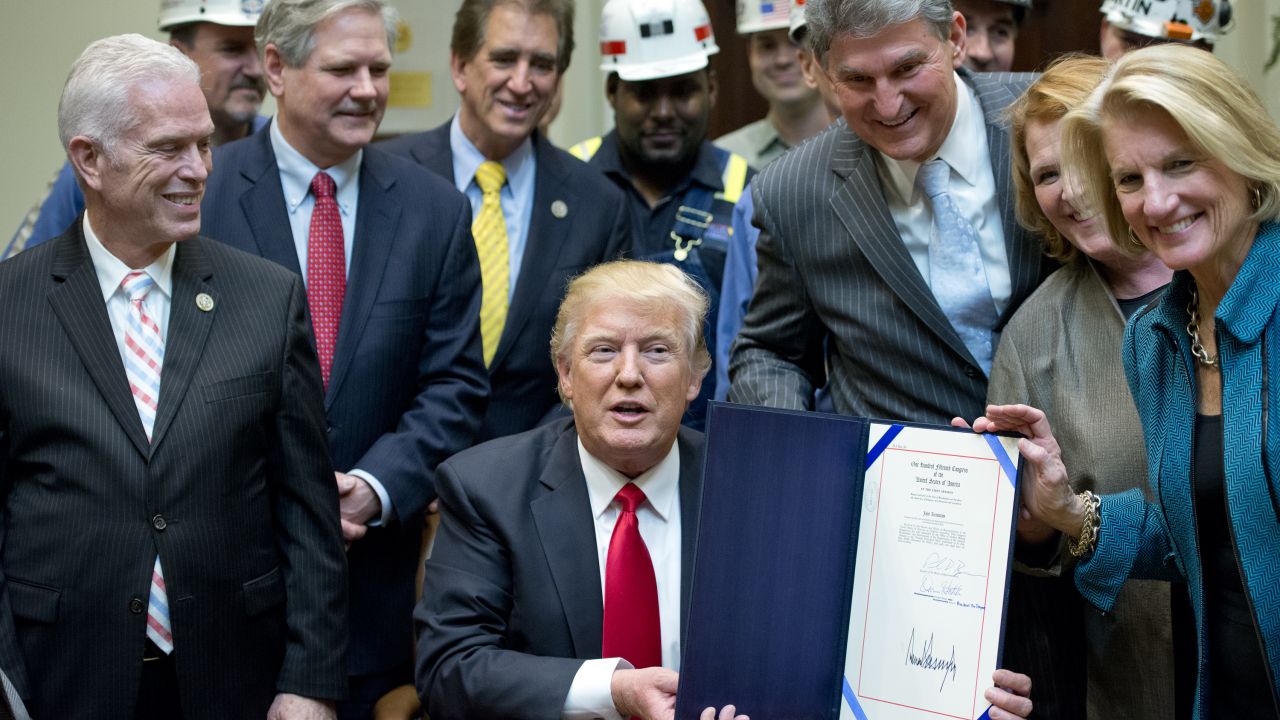
President Donald Trump signs H.J. Res. 38, disapproving the rule submitted by the US Department of the Interior known as the Stream Protection Rule in the Roosevelt Room of the White House on Feb. 16, 2017. The Department of Interior's Stream Protection Rule, which was signed during the final month of the Obama administration, "addresses the impacts of surface coal mining operations on surface water, groundwater, and the productivity of mining operation sites," according to the Congress.gov summary of the resolution. (Photo by Ron Sachs-Pool/Getty Images)
This post originally appeared at the Center for American Progress.
The Trump administration’s natural resource policies have ushered in a new era in which corporations are granted unprecedented control over taxpayer-owned resources. The US Department of the Interior, with the support of President Donald Trump, is inverting the relationship between industry and regulator. From attempts to roll back commonsense protections for clean air and water to proposing drilling in both the Arctic National Wildlife Refuge and the doorsteps of national parks, the Trump administration is catering to fossil fuel industry interests at the expense of future generations.
The Interior Department’s new Royalty Policy Committee is a prominent illustration of how the administration is expanding corporate control over the management of US public lands and taxpayer-owned natural resources. Interior Secretary Ryan Zinke established the committee to advise the federal government on its multibillion-dollar revenue collection program from energy development on public and tribal lands. The establishment of a committee of external advisers is a fine concept at first glance; in reality, however, Zinke’s committee simply serves to empower an industry-led board with a self-dealing mission. Indeed, through this committee, the Trump administration is granting the oil, gas and coal industries the power to determine what “fair” looks like when it comes to the royalties, rents and fees that they pay for the right to drill and mine taxpayer-owned resources.
Zinke has stacked his committee with trade associations and individual companies that stand to benefit from weakened royalty collection policies. These groups also have actively avoided paying what they owe the American taxpayer. Furthermore, the committee is strikingly unbalanced in its partisanship: States that are led by Democratic governors were entirely shut out of the primary membership of the committee. Tribal nations that have expressed substantial concerns about the environmental and social impacts of federal oil, gas and coal policies were likewise excluded from the committee, as were all national fiscal watchdog organizations that represent the interests of American taxpayers.
As the Royalty Policy Committee gathers for its first official meeting tomorrow, it’s worth examining exactly who Secretary Zinke did (and did not) tap to advise him.
Meet your committee
The Royalty Policy Committee is composed of four categories of members: representatives of mineral and energy companies, representatives of states, representatives of tribes and representatives of public interest groups and academia. The Trump administration has stacked each of these categories with members who are predisposed to favor industry-friendly policies at the expense of the US taxpayer and the public interest.
Mineral and energy members
A review of federal data from the past 10 years found that oil and gas companies represented on the committee as members or alternates, or that serve on the trade association boards were responsible for more than half of all fines collected by the Office of Natural Resources Revenue.*
These fines include the following examples:
- Anadarko paid $17 million in 2011 to resolve claims of violating the False Claims Act by knowingly underpaying royalties owed on natural gas.
- Shell paid $2.2 million in 2011 to resolve claims of violating the False Claims Act by knowingly underpaying royalties owed on natural gas production.
- Chevron paid $1.1 million in 2011 for knowingly resuming improper claiming of deductions. In 2012, the company paid another $646,200 in fines for knowingly maintaining inaccurate data on a dozen royalty reports.
Furthermore, committee member Cloud Peak Energy is a coal company that has successfully lobbied the Trump administration to restore a lucrative royalty loophole. The loophole, which the federal government estimates costs taxpayers $75 million per year in lost revenue, allows mining and drilling companies to sell coal, oil and gas to their own subsidiaries at artificially low rates for the purpose of dodging royalty payments.
The industry representatives on the committee have a lot riding on any changes to the royalty rates. Collectively, the companies associated with the committee operate more than 28,000 active leases and have more than 350 applications to permit drilling on public lands pending with DOI. A small change in royalty rate structure could redirect billions in revenues back to the companies, instead of taxpayers.
An analysis of industry revenues over the past four years, for example, indicates the companies represented on the committee would have compensated taxpayers at least an additional $2.1 billion if the onshore royalty rate had been raised from 12.5 percent to 18.75 percent.** The Government Accountability Office recently found that raising the royalty rate to 18.75 percent would probably increase federal revenue with negligible or little effect on production.
States
Each of the six primary members of the Royalty Policy Committee that represent state interests come from states with Republican governors. Colorado, Montana, California, Oregon, Washington are all home to substantial energy development on federal lands within their borders and are led by Democratic governors, yet none of them will have a voice at the table on Oct. 4.
The six states on the committee have also not distinguished themselves for responsible fiscal management of their own resources. Alaska has been battling budget deficits because its general fund is overwhelmingly reliant on oil and gas revenues, which have been falling with collapsing oil prices and declining North Slope production. Texas and Alabama have advocated for transferring federal offshore royalty revenues to the states at massive cost to US taxpayers. Utah, Wyoming and North Dakota, meanwhile, have effective severance tax rates for oil and gas that are below the already low federal oil and gas royalty rate of 12.5 percent.
Tribal nations
The four tribal nations whose representatives Secretary Zinke has chosen to serve as primary committee members are each engaged in substantial energy extraction on their lands and are thereby affected by royalty policies that are established by the Department of the Interior. It is fitting that energy-producing tribes have a prominent voice on the committee.
Zinke, however, has not included tribal nations who are still deeply affected by the impacts of energy policies on federal lands but who themselves are not engaged in substantial energy extraction. The Northern Cheyenne tribe, whose reservation sits amid the coal-rich Powder River Basin in Montana, for example, has advocated for a moratorium on coal extraction on federal lands, while tribal nations in the Northwest have raised concerns about the effects of federally produced fossil fuels on their fishing rights. None of these tribal nations is represented on the committee.
Public interest and academia
The Trump administration made a staggering omission among the members from academia and public interest groups: not a single seat at the table was granted to a national organization that served as a fiscal watchdog on behalf of American taxpayers. After being nominated—but not selected—to serve on the Committee, Taxpayers for Common Sense President Ryan Alexander said she was “disappointed that neither [she] nor any other taxpayer advocate was appointed to the Committee.”
Chronicle of a royalty rate foretold
With its Royalty Policy Committee stacked in favor of industry interests, the Trump administration has already outlined the types of policies it wants the committee to rubber stamp:
- In March, the Trump administration illegally delayed implementing the same loophole that Cloud Peak exploited to cheat taxpayers. (The Obama administration had successfully closed it through an updated rule.) It is now rewriting the rule. In August, Zinke took action to reopen the loophole, and the federal government acknowledged reopening the loophole will cost taxpayers $75 million per year in lost revenue.
- In July, the Interior Department lowered the rate for drilling in shallow waters of the federal Outer Continental Shelf from 18.75 percent to 12.5 percent. The rate now matches the low onshore royalty rate.
- In March, Zinke halted a comprehensive review underway of the federal coal program, suggesting the Royalty Policy Committee would be capable of performing this task. In doing so, he stymied a top-to-bottom review, where royalty payments are only part of the equation for how taxpayers are compensated for publicly owned fossil fuels that private sector companies mine and drill.
There is a desperate need for a robust, honest conversation around royalty rates and how the government values America’s natural resources. The federal government has not updated the royalty rates since 1920 — and federal royalty rates for oil and gas lag behind most state and private rates. Taxpayers are losing out on a fair return to the tune of more than $500 million per year in just the Rocky Mountain West. But Zinke’s committee — which is handpicked to favor the fossil fuel industry — is unlikely to be the place where these much-needed conversations take place.
* Author’s note: There are three trade associations on the Royalty Policy Committee as members or alternates. The National Ocean Industries Association lists its board of directors and their affiliations on its website. Western Energy Alliance (WEA) recently moved its board listing to a portion of its website which is only accessible by WEA members. This Center for American Progress analysis therefore assumes WEA’s current board is the same as the board listed in July 2017, according to web archives. Only three of the four divisions of the US Oil and Gas Association list their board members online and were therefore included in the analysis: Louisiana Mid-Continent Oil and Gas Association (LMOGA), Oklahoma Oil and Gas Association (OOGA) and Texas Oil and Gas Association (TXOGA). The percentage of fines paid to the Office of Natural Resources Revenue could therefore be higher. The number of current leases and pending applications to permit drilling could also be higher.
**Author’s note: The estimated $2.1 billion comes from companies that only have onshore operations. Because revenues for companies who drill onshore and offshore cannot be separated by whether the revenue came from oil and gas on or offshore, the estimation omits such companies and is therefore an underestimate.
The author would like to thank Kate Kelly, Matt Lee-Ashley, and Emily Haynes for their contributions to this column.




